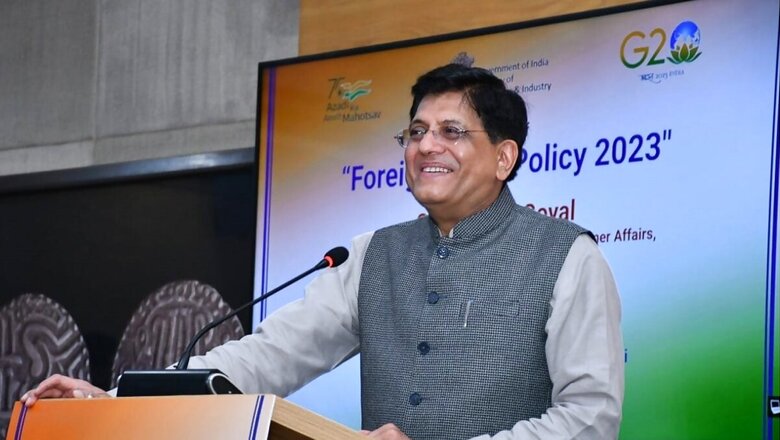
views
The government on Friday released the Foreign Trade Policy 2023 with a long-term focus, to provide the policy continuity and a responsive framework. It seeks to boost India’s exports to $2 trillion by 2030. Here are the key highlights of India’s latest foreign trade policy:
No 5-Year Policy: The FTP 2023 is not a five-year policy. It is a policy with no end date and subsequent revisions in the FTP will be done as and when required and shall not be linked to any date.
Tax Remission Instead Of Incentives: The FTP 2023 has shifted to tax remission and entitlement-based regime, compared with the incentives-based regime earlier.
Focus on Emerging Areas: The FTP 2023 focuses on emerging areas including e-commerce exports, developing districts as export hubs, and streamlining SCOMET policy, among others.
Paperless Approvals: The policy envisages online and automatic approvals of various permissions under Foreign Trade Policy-based on process simplification and technology implementation.
Reduction In User Charges For MSMEs: The FTP 2023 reduces application fee for advance authorisation and EPCG schemes. It will benefit 55-60 per cent of exporters who are MSMEs.
E-Certificate of Origin: Revamp of E-Certificate of Origin Platform Proposed to provide for self-certification of CoOs as well as automatic approval of CoOs, where feasible.
Export Promotion Initiatives: Status holder export thresholds have been rationalised, merchanting trade reform, rupee payment to be accepted under FTP schemes, four new towns of export excellence identified.
Districts As Export Hubs: The policy envisages creating institutional mechanisms at state and district levels to strategise exports. Districts as Export Hubs aims to boost India’s foreign trade by decentralising export promotion.
E-Commerce Exports: All FTP benefits to be extended to e-commerce exports. Necessary enablement of IT systems in Department of Commerce, Post, CBIC will be undertaken in the six months. To streamline e-commerce export facilitation, guidelines are being formulated in consultation with other ministries to facilitate further exports under e-commerce. Apart from this, designated hubs with warehousing facility will be notified.
Amnesty Scheme for Default In Export Obligations: In the interest of trade and industry and to motivate the exporters, relief will be provided to exporters who are unable to fulfill their EO against the EPCG and Advance Authorisations. Amnesty scheme for one-time settlement of default in export obligation by Advance Authorisation and EPCG authorisation holders is being introduced.
Manufacturing Boost:
- The Prime Minister Mega Integrated Textile Region and Apparel Parks (PM-MITRA) scheme has been added as an additional scheme eligible to claim benefits under CSP (Common Service Provider) Scheme of Export Promotion Capital Goods Scheme (EPCG)
- The dairy sector to be exempted from maintaining Average Export Obligation – to support dairy sector to upgrade the technology
- Battery Electric Vehicles (BEV) of all types, Vertical Farming equipment, Wastewater Treatment and Recycling, Rainwater harvesting system and Rainwater Filters, and Green Hydrogen are added to Green Technology products – will now be eligible for reduced Export Obligation requirement under EPCG Scheme
- Benefits of Self-Ratification Scheme for fixation of Input-Output Norms extended to 2 stars and above status holders in addition to Authorised Economic Operators at present
- Fruits and Vegetables exporters are being included for double weightage for counting export performance under eligibility criteria for Status House certification. This is in addition to existing MSME sector who also get double weightage.
Read all the Latest Business News here


















Comments
0 comment